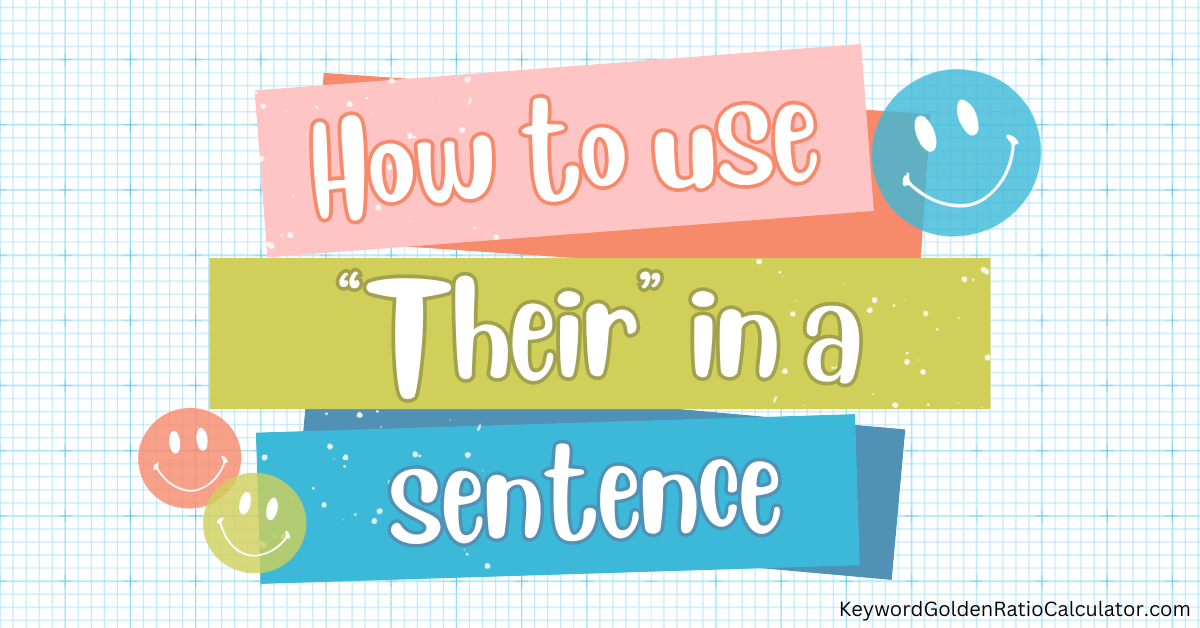English belongs to a family of languages that is rich in vocabulary and grammar rules.
Occasionally, this richness can result in confusion, especially when dealing with possessive pronouns like “their”.
The primary purpose of this blog article is to demystify the usage of “their” and equip you with all the necessary knowledge for using it flawlessly in your sentences.
Who Needs “Their” Anyway?
“Are ‘theirs’, ‘there’ and ‘they’re’ competing for a spot in your sentences?” A question we all have encountered while writing or speaking English.
The answer is all of them coexist, but their correct usage is what makes the difference.
‘Their’ is a widely used possessive pronoun that signifies ownership and can help to express yourself better and more accurately.
Clarifying the Difference
Many often mix up “their”, “there” and “they’re” because they are homophones i.e., they sound alike. However, their usages vary greatly.
- “Their” is a possessive pronoun. It shows something belongs to or is related to them.
Example: Their car broke down near the post office.
- “There” refers to a place or position, either physical or metaphorical.
Example: There is a beautiful park near my house.
- “They’re” is a contraction, combining “they” and “are”.
Example: They’re arriving at the airport tomorrow.
Delving Deeper: “Their” Unleashed
In order to possess an unrivaled understanding of ‘their’, let’s dive into the specifics.
‘Their’ as a term resides comfortably in the English parlance as a third person plural possessive pronoun.
It refers to a thing or things belonging to or associated with the people or things previously mentioned or easily identified.
An Array of Usages
“Their” is quite versatile when it comes to using it in sentences.
- Ownership or Association
“Their” is often used to indicate belonging or association.
Example: The Smith children love their cat.
In this sentence, ‘their’ indicates the cat belongs to the Smith kids.
- Gender-neutral Singular Pronoun
In many instances, to promote gender neutrality or when the gender of the person referred to is not known, “their” is increasingly being used as a singular pronoun.
Example: Every student should submit their assignment on time.
Identity Crisis? ‘Their’ and ‘They’re’ in Sentences
Proper use of ‘their’ and ‘they’re’ is pivotal in order to maintain the integrity and flow of sentences. But confusion might arise if we are not vigilant.
Beware of Mistakes!
A common mistake people often make is replacing ‘they’re’ with ‘their’ and vice versa.
One effective way to avoid this is by checking what the sentence would look like if we write ‘they are’ instead of ‘they’re’, and if it supports the meaning of the sentence, we are correct; if not, we must replace ‘they’re’ with ‘their’.
Example:
Incorrect – “I think their going to the movies.”
Correct – “I think they’re going to the movies.”
(As ‘I think they are going to the movies’ makes sense)
One way to check your sentence for correctness is to expand ‘they’re’ to ‘they are’. If the sentence still reads correctly, you’re on the right track. If it doesn’t, “their” is probably what you need.
In Conclusion, ‘Their’ is not an enemy of your scholarly articles or business emails.
It is a useful grammatical device when properly harnessed.
With a bit of practice, you will be flaunting your flawless grammar skills and successfully employing ‘their’ in your conversations, writings, and presentations.
Happy learning, and keep exploring!
Sources: Grammarly, Oxford Languages
FAQs About “How to Use “Their” in a Sentence?”
What does “their” mean in English?
“Their” is a possessive pronoun in English. It is used to show something belongs to or is related to a group of people or things that have been previously mentioned or are easily identified.
When should I use “their” in my sentences?
Use “their” when you want to indicate possession or belonging relating to a group of people or things. It is also commonly used in writing and speech to refer to a singular person whose gender is unspecified.
Can you give me an example of a sentence using “their”?
Sure! Here’s an example: “The students gathered all their books before leaving the classroom.” In this sentence, “their” is used to show that the books belong to the students.
Is it correct to use “their” to refer to a single person?
Yes, it is correct to use “their” to refer to a single person when the gender is not specified or when you want to avoid specifying a gender. For example, “Each student should bring their own pencil.”
Why is the use of “their” in singular form considered grammatically correct?
The use of “their” in the singular form is considered grammatically correct because English lacks a gender-neutral singular third-person pronoun. To fill this gap, “their” is often used, and it has been recognized as grammatically acceptable by many language authorities.
Can “their” be used for inanimate objects?
Yes, “their” can be used to refer to inanimate objects, especially when talking about a group of things. For example, “The houses had their roofs blown off by the storm.”
What is the difference between “they’re”, “there”, and “their”?
“They’re” is a contraction of “they are”, “there” refers to a place, and “their” is a possessive pronoun. For instance, “They’re going to their house over there.”
Can “their” be used at the beginning of a sentence?
Yes, “their” can be used at the beginning of a sentence. For example, “Their home was filled with laughter and joy.”
Can the use of “their” change the meaning of a sentence?
Yes. The incorrect use of “their” can change the meaning of a sentence. For instance, misusing “their” in place of “there” or “they’re” can lead to confusion or misunderstandings.
How can I practice using “their” correctly?
You can practice using “their” correctly by writing or speaking sentences that require the use of this pronoun. Try reading books or online articles, taking note of how “their” is used in different contexts, and then writing your own sentences using “their”.

